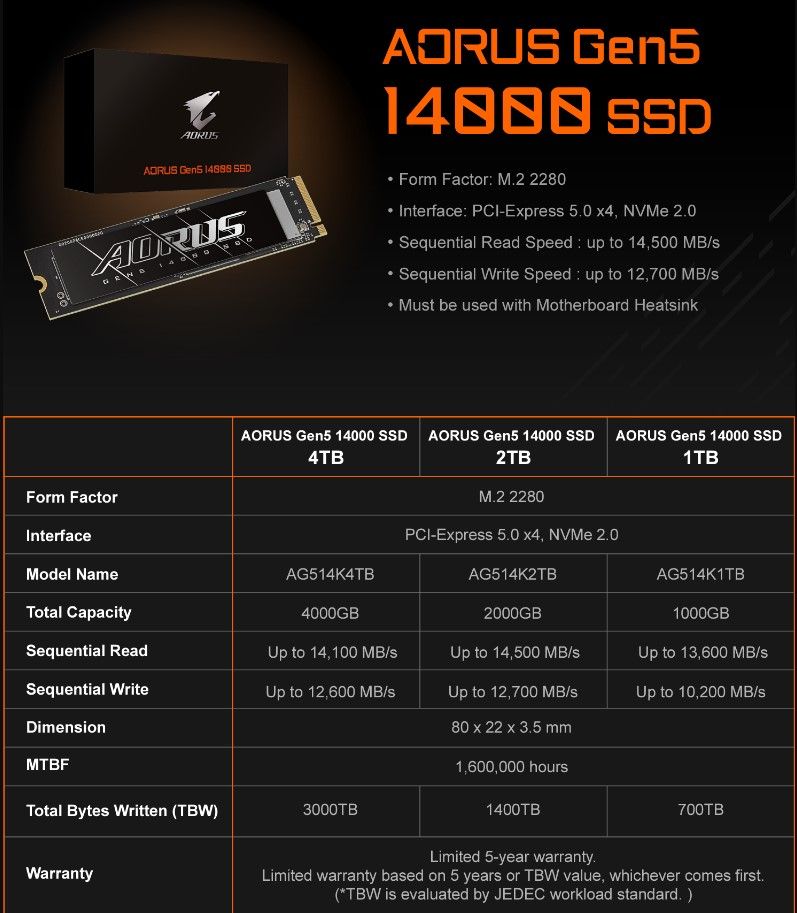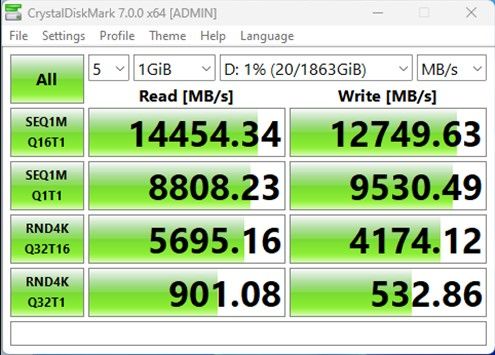
Gigabyte Introduces Blazing Fast AORUS Gen5 14000 SSD with Up to 4 TB Capacities and 14.5 GB/s Speeds
Gigabyte has unveiled its latest AORUS Gen5 14000 SSD, boasting incredible speeds of up to 14 GB/s and offering capacities of up to 4 TB.
Gigabyte Unleashes 14.5 GB/s Transfer Rates with AORUS Gen5 14000 SSD Series
Gigabyte has continuously advanced its Gen5 SSD offerings, pushing the boundaries of speed. The company’s journey in the Gen5 SSD segment began with the AORUS Gen5 10000 series, followed by the AORUS Gen5 12000 series. Now, Gigabyte introduces its fastest model yet, the AORUS Gen5 14000. Key features include:
- Form Factor: M.2 2280
- Interface: PCI-Express 5.0 x4, NVMe 2.0
- Total Capacity: 1 TB, 2 TB, 4 TB
- Sequential Read Speed: Up to 14,500 MB/s (2 TB variant)
- Sequential Write Speed: Up to 12,700 MB/s (2 TB variant)
- Warranty: Limited 5-years
- Usage Note: Must be used with Motherboard Heatsink

Image Credit: Gigabyte
The AORUS Gen5 14000 SSD is powered by the Phison PS5026-E26 Gen5 controller, utilizing a 12nm process node and 232-layer 3D TLC NAND Flash. This setup includes 8 flash channels with 64 CEs and DDR4 caching support. The SSDs comply with the NVMe 2.0 standard, offering double the speed of the fastest PCIe Gen4 SSDs, which peaked at around 7.4 GB/s.
Performance Specifications
The Gigabyte AORUS Gen5 14000 SSD features a read speed of up to 14,500 MB/s (14.5 GB/s) and a write speed of up to 12,700 MB/s (12.7 GB/s). Speeds vary by model, with the fastest being the 2 TB drive. The 1 TB drive is rated at 13,600/10,200 MB/s, while the 4 TB variant achieves speeds of 14,100/12,600 MB/s for read and write, respectively.
- 1 TB Drive: 2 GB of LPDDR4
- 2 TB Drive: 4 GB of LPDDR4
- 4 TB Drive: Up to 8 GB of external cache
- Maximum Operating Power: 11.5W for all drives
- MTBF (Mean Time Between Failures): 1.6 million hours

Image credit: Gigabyte
Cooling Recommendations
Due to their high-performance nature, Gigabyte recommends using a dedicated heatsink for its AORUS Gen5 14000 SSDs, as they can get hot under peak loads, similar to most Gen5 drives. While the company has not yet revealed a specific heatsink model for these SSDs, it is expected to release one in the future. Pricing and availability details are currently unavailable, but a launch is anticipated in the coming months.








By Andrej Kovacevic
Updated on 14th July 2024